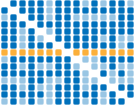József Attila: Favágó
Favágó (Hungarian)Vágom a fát hűvös halomba,
|
El leñador (Spanish)Corto la leña, crece el montón fresco. El nudo, chirriando, resplandece. Sobre mi pelo alado cae escarcha y luego me hace cosquillas en la nuca. Corre mi tiempo sobre terciopelo.
En lo alto reluce el hacha de la helada. Chisporrotean tierra y cielo, ojos y frente. Cimbra el alba, vuelan luces-astillas. Allá otro leñador, gruñendo, agita el hacha. He devastado el tronco; sólo tendré las ramas.
¡Vamos, golpea alegremente el duro tronco!* Que no te asuste ya la más pequeña astilla. Si asestas el hachazo en el sitio debido, el senorial desierto crujirá y el hacha gruesa sonreirá.
*El poeta emplea el vocablo húngaro’tőke’ que significa, a la vez, tronco y capital.
|
||||||||||





